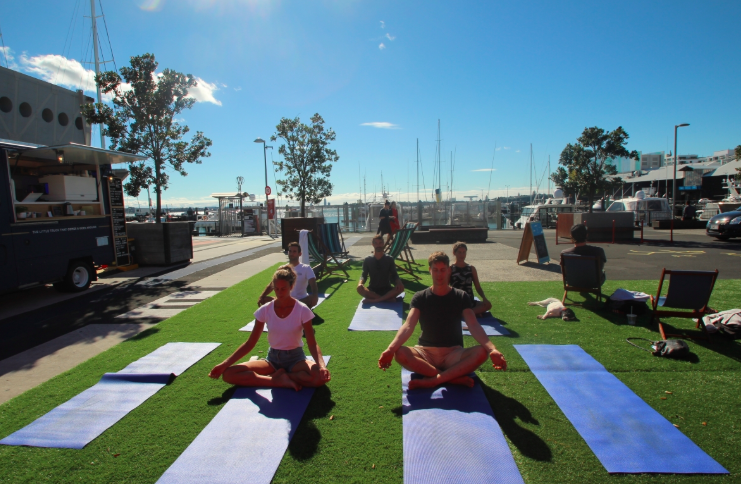
Panuku has created this Urban Lab – a place where we can test our ideas and theories by demonstrating change in the city and help people to develop tools for change. We’re using a range of tactics to show what change might look like, we’re rolling out mindfulness classes to help people to be aware of their behaviours when experiencing change, and we’re demonstrating the types of social behaviours we’d like to see in the city.
As we meet the needs of a rapidly growing Auckland, many people will experience change in their streets, their neighbourhoods, and their communities. This includes an efficient and effective transport network, more houses, cleaner water and a healthier environment.
Panuku plays a large part in delivering this vision, and as the council organisation tasked with redevelopment, we’re often the ones on the ground, talking to people about how the city is going to change for the benefit of its people.
It’s no secret that we’re short on space in the city, and one of the ways that we optimise our assets is to transform car parks into places for people.
Communicating this sort of change is often difficult, because people are inherently fearful of what this change means to their everyday lives. As an example, it may mean parking somewhere else, or trying out a new way of moving about such as taking the bus, riding a bicycle, or walking. This is where people need demonstration, to experience an alternate reality. This is where tactical urbanism comes in.

Tactical urbanism
Tactical urbanism is an umbrella term used to describe a collection of low-cost, temporary changes to the built environment, usually in cities, intended to improve local neighbourhoods and city gathering places.
We’re demonstrating through tactical urbanism that cities can bring change for people in a way that is lighter, faster and cheaper. These demonstrations can be changed quickly to respond to the way that people use them, and we can use the data gathered from these places to inform other changes we’d like to make around the city.
Given the importance of delivering the change the city so desperately needs, we must help people to feel comfortable with contributing to the discussion. We need to encourage people to be mindful of their own behaviours, and the behaviours of others, so that we can all have honest, open and meaningful conversations about what that change might mean.

Eastern Viaduct as an Urban Lab
The Eastern Viaduct Urban Lab has introduced free bi-weekly yoga and mindfulness classes for anyone who wants to join in. We recognise that practising mindfulness gives us the ability to understand change and to understand our own behaviours. A series of studies in the journal Psychological Science found that mindfulness helped counteract deep-rooted tendencies and leads to better decision-making. Researchers have found that a brief period of mindfulness allows people to make more rational decisions by considering the information available in the present moment, which led to more positive outcomes in the future.
The Urban Lab also aims to demonstrate the behaviours we are encouraging in the city. We hold bicycle meetups with a bike mechanic, to encourage people to consider an alternative mode of transport. We’ve added diversity to the food offering in the Viaduct by assembling a group of local start-up food businesses, who are providing affordable, fresh and healthy food. We’re recognising Auckland’s many nationalities through language week activations, with Samoan and Cook Island languages featuring recently.
If you visited the Urban Lab on World Environment Day or World Ocean Day, you would have experienced our Environment Hub, a series of installations and activations that promoted awareness of the behavioural changes we all need to make, to ensure that the environment we pass to future generations is cleaner than it is now.

Change for the future
Achieving Auckland’s vision of an efficient and effective transport network, more houses, cleaner water and a healthier environment, needs everyone to understand what that change means for them. The Urban Lab is about demonstrating what that change looks like, giving people the tools to change, and helping people to understand their behaviours while experiencing change.




